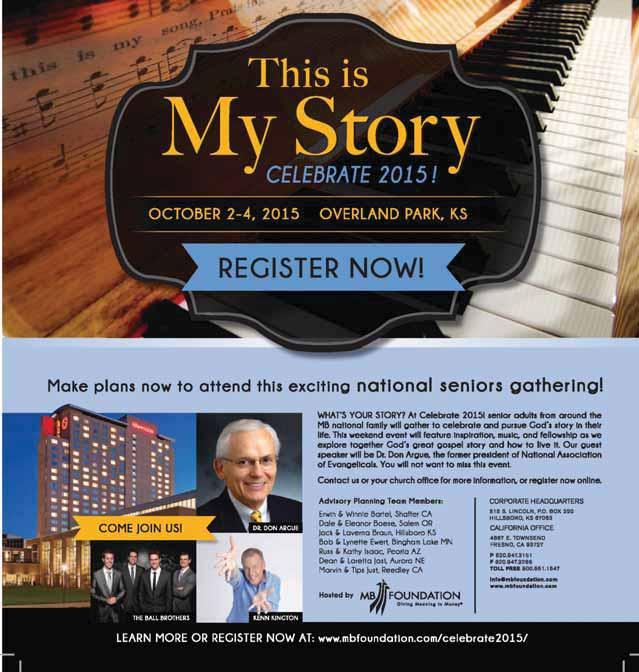




10 Conflict happens
12 Self-worth; deep roots
20 FPU grad highlight

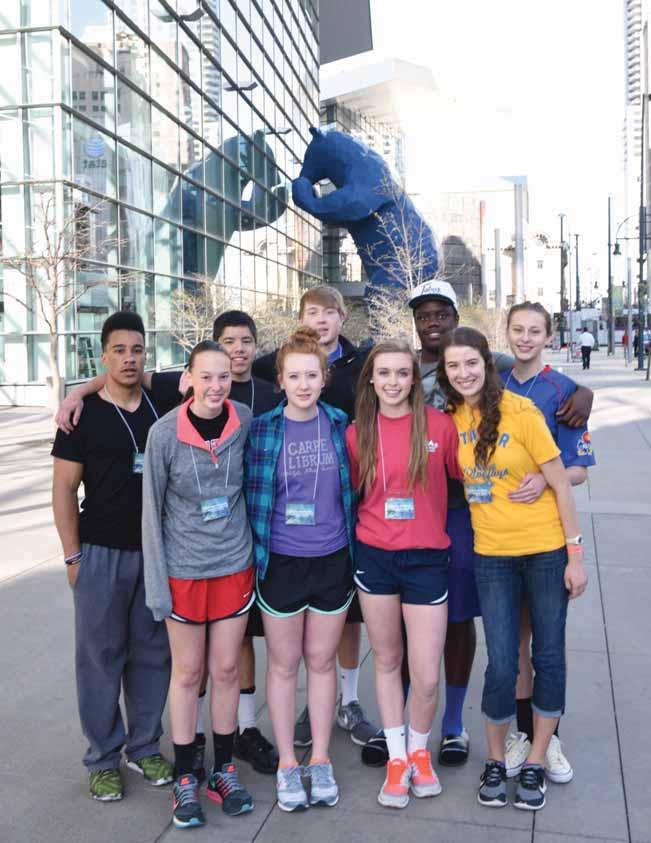



The intent of the Named 2015 planning team was to put together a national youth event that would instill in students a new or renewed understanding of what it means to have their identity rooted in Christ, a truth that many of those who work with the youth in our churches say Christian teenagers often struggle to understand.

Connie Faber Editor
Ihave only a misty memory of Grandpa Winter, my grandma’s father. Maybe I think I can remember him because of a black and white photo of my sister and I standing by this tall, thin old man—but I’ve had the memory for all my life so I consider it a legitimate recollection. This is the season for recognizing the influence of parents: Mother’s Day is observed in May, and Father’s Day follows in June. So it’s an appropriate time to say how thankful I am for the privilege of remembering at least one greatgrandparent and of having clear and happy memories of all four of my grandparents. I am also blessed that my grandparents and great-grandparents were followers of Jesus Christ, as are my parents. I am proud of a heritage that includes the names Winter, Eitzen, Loewen and Jost as well as the names Faber, Van Grouw, De Boer and Hengeveld, thanks to my husband.
My spiritual heritage includes another name: Mennonite Brethren. I was reminded of the importance of knowing and claiming this spiritual heritage during Named 2015, the USMB National Youth Conference held April 9-12 in Denver, Colo. The intent of the Named 2015 planning team was to put together a national youth event that would instill in students a new or renewed understanding of what it means to have their identity rooted in Christ, a truth that many of those who work with the youth in our churches say Christian teenagers often struggle to understand. Speaker John Richardson did an excellent job of outlining just what it means to have one’s true identity rooted in Christ and of challenging the students to live out that identity.
Richardson talked with the students Saturday evening about their shared identity—“us together” as a Mennonite Brethren family that is making a difference in local communities and around the globe. He talked about Mennonite Brethren having a passion for reconciliation and peace, community and togetherness and social justice. “I’m Mennonite Brethren because this family fleshes out what it means to follow Jesus better than any other I’ve seen,” Richardson told the students.
The next morning during the closing session, Wendell Loewen, a Tabor College faculty member, elaborated on Richardson’s description of the Mennonite Brethren family. Loewen gave a brief rundown of the events that led to the formation of the Mennonite Brethren Church and summarized our understanding of what it means to be followers of Jesus, including proclaiming the gospel in word and deed. “God is on the move through this tiny movement called Mennonite Brethren,” he said, noting that thanks to our mission-minded spiritual ancestors there are more Mennonite Brethren today in India and Africa than in North America. “This is part of your identity,” Loewen reminded the audience that morning.
I am thankful for the upcoming holidays that remind me of the good people that populate my family tree. But more important than the Hallmark holidays is the church celebration May 24 of Pentecost, when we commemorate the gift of the Holy Spirit. That Spirit guided the founders of the Mennonite Brethren Church. May it continue to guide us as we claim our identity as followers of Jesus.
















Scott Crook

The day following Jesus’ miracle of the feeding of the 5,000 as recorded in John 6, Jesus discusses with the crowd in Capernaum a greater meaning to the miracle. He warns them that if they follow him only to get more food, they will miss out on a greater blessing. He tells them they need to believe in him. They speak of how God had miraculously fed their ancestors in the wilderness with manna—bread from heaven. They saw this as a miraculous sign from God, and they want another miraculous sign from Jesus. Jesus tells them that God gives the true bread from heaven, which gives life to the world. The crowd responds, “Sir, give us this bread always.” Jesus says, “I am the bread of life; whoever comes to me shall not hunger, and whoever believes in me shall never thirst.”
One of the challenges I have with my family is choosing a restaurant when going out to eat. With the different tastes of my six children along with my wife’s and mine, an all-youcan-eat buffet offers the variety that satisfies. Each person finds what fills and pleases, and we leave accomplishing the goal— to eat and to celebrate. Whenever we do this, I always feel hungry and thirsty sometime after. Whether in the morning, the next day or later, I am hungry and look for my next meal.
With that thought in mind, Jesus isn’t equating himself with some all-you-can-eat physical buffet when he says he is the bread of life and whoever comes “…shall not hunger, and… shall never thirst.” Jesus means that there is a hunger in our souls for something only he can satisfy. In coming to him in faith, we find in a relationship with Jesus Christ the satisfaction for our soul’s hunger and thirst. We understand this relationship is eternal life, for Jesus promises to raise up each person who comes to him (John 6:39-40, 44). As Jesus equates himself with eternal life, we know the eternal saving power of God, in Christ, that is ours at conversion.
We also come to know spiritually sustaining power from an ongoing dependent relationship with Jesus. We will need to keep coming to Jesus to satisfy our desire for more of him. Something in us is only satisfied by him, and the more we get, the more we desire. We must resist the temptation to search in wrong places to satisfy that longing. We were designed to worship, but can be “idolatrous” by looking somewhere other than Jesus to find that which can be found only in him—soul satisfaction. Jesus is the bread of life, which eternally satisfies the hunger of our souls.
Scott Crook is lead pastor at Grace Bible Church in Gettysburg, SD.
“Jesus said to them, “I am the bread of life; whoever comes to me shall not hunger, and whoever believes in me shall never thirst.”
John 6:35

May / June 2015
Volume 78 • Number 3
Connie Faber EDITOR
Myra Holmes ASSISTANT EDITOR
Shelley Plett GRAPHIC DESIGNER
Vance Frick
COVER PHOTO (See special report page 14) Pictured are members of the Hillsboro (Kan.) MB Church youth group
The Christian Leader (ISSN 0009-5149) is a gathering place for the people, passions and mission of U.S Mennonite Brethren. The Christian Leader is published bimonthly by the U.S. Conference of Mennonite Brethren Churches. However, the opinions expressed here are not necessarily those of the church as a whole.
COPYRIGHT The articles printed in the Christian Leader are owned by the CL or by the author and may not be reprinted without permission. Unless noted, Scripture quotations are from the New International Version.
READER PARTICIPATION Letters to the editor should be 300 words or less and on one subject. Letters must be signed and include the writer’s city and state. Letters will be edited for clarity, appropriateness and length. Letters will be published, as space allows, unless marked, “Not for publication.” Readers interested in contributing essays for In My Humble Opinion and First Person should contact the editor. Freelance article submissions are welcome; a SASE must accompany articles.
SUBSCRIPTIONS $10 for six issues and $20 for 12 issues ($15, $30 in Canada; all other countries $25 for six issues); $1.50 per copy
CORRESPONDENCE: All correspondence, including subscription questions and address updates, should be addressed to Christian Leader Box 155, 107 N. Main, Hillsboro, KS 67063-0155 Phone: 620.947.5543
E-mail: christianleader@usmb.org
MEMBERSHIP The Christian Leader is a member of the Evangelical Press Association and Meetinghouse, an association of Mennonite and Brethren in Christ editors.
POSTMASTER Send address changes to Christian Leader, Box 155, Hillsboro, KS 67063. Periodicals postage paid at Hillsboro, Kansas.
The Christian Leader is published by

U.S. Conference of MB Churches

Jon Isaak
As I have opportunity to speak about God’s work among Mennonite Brethren—our history and theology—I continue to be amazed by this 155year-old story, a story that remains surprisingly relevant. Let me explain.
The MB story—from birth to the present—is the story of a renewal movement within the larger Mennonite tradition. As such, Mennonite Brethren have selfidentified as a Spirit-led church, reaching outward to the watching world with Jesus’ good news of God’s salvation, deliverance and healing.
Because of our history, Mennonite Brethren can be thought of as a “blended family,” one that merges the Mennonite vision together with two particular evangelical visions: those of the German Baptists and the more charismatic-oriented Lutheran Pietists.
The MB renewal movement adopted several charismatic features, as did other 19th-century protestant denominations that were shaped by Lutheran pietistic reforms. Emphases were personal conversion experience, personal devotional Bible study, personal assurance of salvation, personal walk with Jesus and personal discernment of the Spirit’s leading—key words being “personal” and “experiential.”
There was steady traffic from Russia to Germany to learn new evangelistic methods—tent meetings, altar call preaching, Bible school curriculum, prayer meetings, dispensational prophecy charts, gospel-revivalist songs and more. Leaders brought these “charismatic” practices back to the Russian villages and then to the Americas with enthusiasm.
Because the Mennonite Brethren Church blended three theologies—Mennonite, charismatic and Baptist—Mennonite Brethren resisted writing a definitive “theology.” The early MB leaders realized that since theirs was a merger of three distinct theologies, not one of the theologies could be pressed for ultimate clarity, alignment or precision. If any of the three did so, it was sure to offend at least one of the other two.
This is why Mennonite Brethren have chosen to write confessions of faith and uphold the Bible as the final arbiter or referee. Consider three examples:
Mennonite Brethren confessed that God is sovereign, but the confession did not delineate exactly God’s relationship to human freedom.
They confessed that Jesus’ work on the cross saves, but their confession did not spell out which theological atonement model was essential to MB theology.
They confessed the glorious hope of Jesus’ return to judge at the end of time, but their confession did not insist on a particular dispensational or millennial theology, a particular understanding of the State of Israel, a particular understanding of the postmortem reality and so on.
For Mennonite Brethren, these details were the domain of theology, not confession. When pressed for precision, they would say, “What does the Bible say?”
The moderating speech from leading MB voices was usually strong enough to calm tensions if disputes flared up, pointing out the merits of sticking with the Bible and not getting drawn into naming one or other theological interpretation of the Bible—whether Mennonite, charismatic or Baptist—as the one that speaks for the whole MB movement.
This blended family status also explains why many from different Christian traditions have found a church home among Mennonite Brethren. The fact that Mennonite Brethren have historically not pressed for complete theological alignment makes us a very hospitable option. This is not because Mennonite Brethren are so smart, but simply because it would be impossible to achieve complete theological alignment without doing damage to someone in the “family.”
No doubt the increasing theological differences in the family will further challenge Mennonite Brethren to exercise our blended family life skills. Much like the first churches (see Romans 14:1–12), Mennonite Brethren can find encouragement in Paul’s counsel to sit with differences of opinion—refusing to break fellowship over differences, listening together to the Spirit’s leading and leaving final judgments with God.
Jon Isaak is the executive secretary of the MB Historical Commission, the research and archiving service for U.S. and Canadian MB churches (www.mbhistory.org).
The early MB leaders realized that since theirs was a merger of three distinct theologies, not one of the theologies could be pressed for ultimate clarity, alignment or precision.
Jason Priest
Thursday morning, Oct. 9, 2014, my cell phone rang at 7:20. Caller ID said it was Karen Priest, my stepmother calling from Alaska. I quickly did the math—Alaska is three hours behind Kansas time—and knew that no one calls at 4:20 a.m. for a good reason.
“Your brother, Justin, was killed this morning in a car accident in Juneau,” said Karen. “An Alaska state trooper came to our house at 3 a.m. and told us. We are going into Anchorage to tell Cody (another brother) and Julia (Justin’s girlfriend). Will you please pray for us?”

I agreed, and Karen put me on speakerphone so that she and my dad could both hear as I prayed. I asked that God would comfort my father and Karen and that he would prepare Cody and Julia for the devastating news they were about to receive.
After I hung up, I felt lost. I wept. Justin was so young—29 years old. I thought again how hard it is to be so far away from my family. I called my boss and arranged to take time off to go back to Alaska. I thought about making travel plans for my wife and our children to go with me to the funeral. I called our pastor, Brian Allen, who came right over.
Pastor Brian had been at our house for about 10 minutes when my phone rang again.
The caller ID again was Karen Priest. I answered and heard: “Jason, it’s me, Justin. I’m OK. There must have been a case of mistaken identity. I would put Mom on the phone, but she is crying too hard.”
My mind couldn’t reconcile the information that Justin was dead with hearing his voice. It didn’t compute. Stunned doesn’t begin to describe what I was feeling. I told Justin I loved him, and we hung up. Pastor Brian prayed with my wife, Krista, and me, praising God that this brother I thought was lost was alive.

In time, I learned the full story. After calling me and other out-of-state relatives, my parents made the 45-mile drive to Anchorage to tell my brother and Justin’s girlfriend the news in person. They told Cody first and then drove to the house my brother shared with Julia. My dad was shocked when Justin answered the door. Justin had no idea why our dad began sobbing or why the crying turned to screaming and shouts of “Praise Jesus! It’s a miracle!”
When they sorted out what had happened, Justin called the Juneau police to tell them they had identified the wrong Justin Priest. The police apologized for the anguish the mistake caused. By the next day, the mix-up drew national attention.
This experience has reminded me of two important things. Ephesians 2:1 says, “As for you, you were dead in your transgressions and sins....” God’s message of restoration and redemption applies to everyone. So many of us, me included, live without the Spirit and in our own strength, and we live defeated lives. I want to live in total surrender and in the belief that God is the hope of everyone on earth (Ps. 65:5).
Death is so final. When Karen first told me that Justin had died, I was filled with regret for the things I wished I had said to my brother. Please take the time to say what you want to your loved ones. Reconcile with family and friends. There is no hope for restoration if you wait too long. My prayer is that God will use this story to bring others to know him and to restore family relationships.
Jason Priest lives with his family in Hillsboro, Kan., and they attend Hillsboro MB Church. This essay is adapted from an article that first appeared in their church newsletter.
When USMB leaders met March 12-15 in San Diego, Calif., they affirmed a recommendation from the Denominational Review Task Force to concentrate denominational efforts on serving local churches in new ways. A “team of strategic thinkers” will be assigned the task of determining how best to structure USMB to assist and network local churches, says Steve Schroeder, USMB Leadership Board chair.
“While we are still early in our evaluation process, we have come to consensus about a vision of empowering each church to reach their ministry potential,” says Schroeder in a written statement summarizing the Board meeting. “We believe God is calling us to do this through three areas of focus: church multiplication (local, national and global), intentional disciple making and developing leaders.”
Two years ago the Denominational Review Task Force hired consultant George Bullard to lead a structural and vision review of the U.S. Conference of MB Churches (USMB). The recommendation reflects the work of some 40 people who participated in two working retreats led by Bullard in fall 2014. Bullard will continue to work with the strategy team, which will report on their work in October.
The Leadership Summit and Leadership Board meeting, at which the future of denominational ministries was discussed, concluded a week of activities that began with the National Pastors Orientation followed by a Board of Faith and Life meeting.

Approximately 55 delegates representing seven of the nine Latin America MB (LAMB) District Conference churches attended the annual district business meeting held January 30 at Jesus es mi Paz in Pharr, Texas.
The delegates passed a district budget of $10,000 and voted to provide funding for the work of two church plants. Delegates also passed a recommendation to give each LAMB congregation $1,000 out of the total $17,000 one-time gift from MB Foundation with the remaining money going to the Strengthening Fund.
Juan Ramon Sanchez, preaching pastor and elder at High Pointe Baptist Church in Austin, Texas, was the conference speaker. Sanchez also preached at the evening Praise and Worship Conference, which drew about 120 people. A team of musicians led by Dennis Hernandez, of Grace Point @ Grulla, led worship.
The 2015 Mennonite World Conference Assembly will take place July 22-26 at the Farm Show Complex in Harrisburg, Pa.

Assemblies are reunions of the Anabaptist-Mennonite family worldwide and take place every six years. The registration fee for PA 2015 is $575 for global north participants but will increase after June 21. As of March, registrations have come in from 66 countries. The speaker Thursday evening will be Nzuzi Mukawa, team leader for MB Mission in sub-Sahara Africa, a mission professor and associate pastor of MB churches in the Congo.—MWC
The upcoming national seniors gathering hosted by MB Foundation is scheduled for October 2-4 in Overland Park, Kan., and will feature entertainment that will encourage attendees to celebrate life and its stories. Celebrate 2015! will kick off on Friday evening with guest speaker Don Argue, a Christian statesman and visionary leader. Friday evening’s entertainment will feature the Ball Brothers as the musical guests. The audience can expect to hear a mix of musical styles in their “music that spans the generations” blended together by tight, fourpart harmony as they spread the message of the Gospel and encourage believers. Saturday evening one of today’s most sought-after comedians, Kenn Kington, will perform. Kington connects his talent for storytelling with his faith and his passion to encourage people by speaking from his heart and life.— MB Foundation

byTheNumbers
Father’s Day became an official holiday in 1972, 58 years after Mother’s Day was established.
There are 70 MILLION fathers in the U.S. That’s about 46% of the male population.
Around 16% of single parents are men
Father’s Day spending in 2013 totaled $13.2 BILLION. Special outings, electronics and clothing were the top grossers
Source: About.com, Kathln.com
5 minutes with...

Scot Hillman is the volunteer wordmaster for the largest local spelling bee in the country. Each year 250 students compete in the Tulare (Calif.) County Spelling Bee for a chance to go on to the Scripps National Spelling Bee. Hillman, a member of Neighborhood Church in Visalia, Calif., has been wordmaster for 16 years.


What do you do as a wordmaster?
I read the word to be spelled, use it in a sentence and then read it again. I’ll read it over until students are satisfied they have heard the word correctly. I can also give a definition and the language of origin.
Is there some technique to the role?
You never want a child to misspell because you pronounced incorrectly. At first I would always look ahead to preview the next word and sentence, but after 16 years I pretty much know the first 300 words in the books Scripps provides. I’ve also developed a quick eye for reading the phonetic spelling characters like the upsidedown “e” and the “a” with an umlaut over it.
Isn’t the atmosphere at a spelling bee tense?
Yes, the kids are all bigeyed and nervous, but I try to keep it light. This year’s theme was Star Wars so I grew a beard and came dressed in a hooded robe as ObiWan Kenobi.
Always ask the wordmaster if there are alternative pronunciations. Sometimes there’s another way to pronounce a word where the vowel sound just pops out. What advice do you have for a child who is competing?

How is being a wordmaster an expression of your faith?
Christians are called to be servants, and volunteering for the bee and at other community events is a way for me to serve. Of the 250 kids at the bee, 247 will not win a trophy. If I can encourage those 247 and tell them they’re awesome, I’m sharing Christ’s love.
Interview by Kathy Heinrichs Wiest
Fresno Pacific University celebrated the groundbreaking of a new 10,000 sq. ft. AIMS Center for Math and Science Education facility Feb. 4. The AIMS Center provides K12 educators with innovative, research-based teaching practices designed specifically for the diverse backgrounds of Central Valley children. To commemorate the new facility, key educators and elected officials shared how they believe it will ultimately help bridge the significant gap the Central Valley region faces in filling vacant mathematics teaching positions. —FPU
A new biblical commentary released in midFebruary called Lamentations, Song of Songs explores the connection between joy and sorrow in human life through vivid scriptural focus. Written by Wilma Ann Bailey and Christina Bucher, this volume joins the acclaimed Believers Church Bible Commentary series. Topics addressed include communal identity, images of God, response to crisis, the sexuality present in Song of Songs and elements of poetry and story. Each portion of Scripture has an introductory preview, brief summary, explanatory notes, the text in its biblical context and the text in the life of the church. This breakdown makes the passages accessible and relevant for readers with a wide range of experience with Scripture. —MennoMedia
Mennonite Central Committee (MCC) is asking for help to replenish its supplies. The relief agency is in urgent need of 2,000 relief kits, 8,000 hygiene kits and 2,000 blankets. Situations of crisis in Syria, Iraq, Gaza and Ukraine have depleted MCC’s warehouse inventory. MCC sends supplies around the world to offer comfort to families facing disaster or crisis as a tangible way of reminding people around the world that their needs are not forgotten. For more information on making MCC kits or comforters, visit www.mcc.org/kits. —MCC

Liz Wittrig is the recipient of the Mennonite Brethren Historical Commission’s summer archival internship for 2015. As an intern, Wittrig will spend a total of five weeks during June and July visiting each of the MB archival centers in North America (Fresno, Calif.; Hillsboro, Kan.; Winnipeg, Man.; and Abbotsford, BC). She will explore the stories and images housed in these archives, especially pursuing her interest in women’s voices in relation to the Anabaptist peace witness. Wittrig will graduate in May 2015 from Goshen College, Goshen, Ind. –MB Historical Commission




Conflict happens. Prepare for it.
Ihave two sons and daughters-in-law who are Millennials— teens and 20-somethings currently moving into adulthood. I don’t fully understand how or why Millennials think or act as they do, any more than they understand how or why I think and act the way I do.
Millennials, Boomers, Xers, Greatest Generation or The Matures—members of each generation have their own unique perspectives influenced by the culture and climate of the prior generations who raised them. Combined with the political, social, familial and economic environments of their day, these differences are where great things can happen or conflict can begin. In fact, conflict is something we all have in common.
As long as there are two people on earth there will be conflict. I like to say, “Conflict IS.” From the beginning of time, when there were only two people on earth, there was conflict. In Genesis 3, God asks Adam if he ate of the fruit of the tree. Adam is quick to blame Eve for “making” him eat of it and Eve is just as quick to blame the serpent for deceiving her. A careful read of the first 12 verses shows that God personally instructs both Adam and Eve not to eat the fruit or for that matter, even touch the tree. Yet they each blame the other for their own disobedience.
Some of the common perceptions, stigmas and realities of Millennials that parents, employers, teachers and spouses have shared while I’ve conducted conflict coaching sessions or mediations with Peacemaker Ministries have included things such as:
• Millennials have delayed maturity due to “helicopter parents” who swoop in, rescuing at the first sign of trouble rather than letting their kids face consequences on their own.
• Millennials are disorganized, uncommitted and even lazy.
• They have a decreased tolerance for frustrating circumstances because Millennials are accustomed to instant gratification.
• Millennials are disadvantaged in relationship building because technology has reduced human interaction and engagement skills.
• Millennials are also viewed as the most optimistic generation. They are workhorses, often unorthodox in their approach and with a persistent hunger to discover new experiences, take advantage of opportunities and push boundaries that allow them to make a positive difference in the world. Millennials can be more passionate and more engaged in life itself, not just work.
From my personal experience, I would agree that all of the above are true with some Millennials, some of the time.
Some of the common perceptions, stigmas and realities of Boomers, those born between 1946 and 1964, according to the Millennials I have engaged with are: Boomers are too focused on money and careers, abuse the environment and are hypocrites when it comes to honesty, obeying the law or loving God and others. They can be micromanagers, resistant to change or warmongers, willing to fight for and over anything.
Millenials also see that some Boomers are great leaders, mentors and role models. They see hard workers, dedicated to their careers and families. I agree that all of the above are true with some of the Boomers and Xers, some of the time.
We all have legitimate interests in life. Sometimes our interests don’t align with those of others. That does not make either point of view wrong; they are simply different. How do we respond in a healthy manner to the tensions created by these differing interests?
Healthy tensions are a normal part of good relationships. If we handle the tension well it can be highly beneficial and productive. If we handle the tension poorly we can cause conflict. This often centers on differing generational interests.
What does this mean for how we should engage and be engaged in conflict across generational lines? It means the same thing for every believer. Conflict happens. And it will continue to happen until the Lord returns. So what can we do about it? How are believers called to respond to conflict in a different way? What does that look like?
The conflict addressed in Scripture is no different than what we see today, as evidenced by the marital failures, church splits, murders, suicides and wars reported in the
By Dale Pyne

news and of course, the nasty Facebook spats we all witness from time to time. Therefore we should prepare for when—not if—conflict occurs. Many of the severe consequences can be completely avoided if we simply take better paths.
It is difficult, so unnatural, to simply say something like this to God and others: “You are right; I am wrong. I regret this mistake. It must have hurt you deeply and I am sorry. Will you forgive me?” Imagine how much better life would be if we could add these 24 words to our vocabulary! We could have hearts prepared to recall and deliver a sincere, appropriate response at the beginning of a conflict rather than the pride or fear-driven responses like gossip, anger and blame-shifting that cause so much suffering for us and others.
“ Healthy tensions are a normal part of good relationships…. If we handle the tension poorly we can cause conflict. This often centers on differing generational interests.”
The ultimate love story
God calls us to be intentional with each other when we have conflict. He tells us to go privately when we are offended, to work out differences and, if possible, to make friends (Matt. 18:15). He also calls us to go to others when they are offended by our actions (Matt. 5:23). He tells us to seek him first (Matt. 6:33) and to clothe ourselves with kindness and humility, gentleness and patience, to bear
with each other and forgive one another, forgiving as the Lord forgave us (Col. 3:12-14).
Read the story in Matthew 18:12-14 of the shepherd who leaves his 99 sheep to search for the one that is missing. What a beautiful parable depicting the compassion the Lord has for each of us and the unmerited grace he has given us. God’s plan is the ultimate love story, but it is not just between him and us. He also calls and empowers us to provide that same love for others here on earth today.
How do we do this? How do we stop ourselves in the midst of emotional responses to someone else’s offensive words or actions? God is not asking us to do this on our own. The good news is, he promises to provide everything we need for life and holiness so we can escape the corruption of the world (2 Peter 1:3-4). He does call us to take action. 2 Peter 1:5-7 provides specific instructions; for this very reason, you must make every effort to support your faith with goodness, and goodness with knowledge, and knowledge with self-control, and self-control with endurance, and endurance with godliness, and godliness with mutual affection, and mutual affection with love.”
Truly, we cannot love one another without the power given us through the Spirit of God.
We know conflict IS. It happens. We know conflict is not unique to one generation. Each generation has its own personality, a unique view of life and perception of the older and younger generations. So what can we all do to honor one another? And the most important question of all: What can everyone do to honor God?
Conflict happens. Prepare for it. Have a plan and practice the biblical applications mentioned above. Look for the good in others while critically looking in the mirror at your own actions. Be grace filled, forgive and don’t separate truth from love or love from truth. These are the activities that bring peace and hope in our lives and in the lives of others.
Dale Pyne is the CEO of Peacemaker Ministries in Colorado Springs, Colo. USMB partners with Peacemaker Ministries to train leaders and pastors for conflict resolution and recommends Peacemaker Ministries resources to congregations.
IIs our self-worth rooted in God’s love for us?
idea of being “wonderfully complex” and a “marvelous workmanship” (Ps. 139:14, NLT) started to soften the soil of my hardened heart. The idea that God might actually like me slowly started taking over the staunchly planted weed of being unlovable in God’s sight.


’m not exactly sure how this message got lodged in my brain as a young person, but it was loud and clear: God didn’t like me. In today’s youth culture, one would say God was a “hater,” and I felt like the target. This misunderstanding affected my self worth for years, and it drove me to distrust God’s love as a good thing. After all, I couldn’t put myself in the care of a being that didn’t value me. Yet deep down, in a small corner of my soul, I dared to hope that if I did the right things and behaved perfectly, God would like me and find me worthwhile, at least until I messed up again.
This thinking did me no favors, and as an adult I began to earnestly seek a different understanding of God’s love. I desperately wanted to root my worth “deep into the soil of God’s marvelous love” (Eph. 3:17, NLT). But first I had to believe that this soil would not reject my “roots” or me. I had to trust that the soil would be rich with healthy nutrients to help me grow, as opposed to a hard soil or one that would eventually lead to root rot.
This search led me to study Psalm 139 for several years, and an amazing and life-transforming idea began to take hold of me. The
Given my own struggle, I have been curious about what young people today think about self-worth in relation to God’s love, so I jumped at the invitation to be a seminar speaker at the regional Southern District Youth Conference last November. With the permission of the 25 to 30 students who were in this seminar, “The Truth About Ourselves,” I am sharing some of their thoughts. We started by examining sources of self-worth. The sources the students listed were: social media, accomplishments, friendships, possessions, skills (sports), career, college, a Mennonite last name, parents, image and religious beliefs. Interestingly, no one said “God” specifically. Most of the discussion centered on what

friends and family think about them, especially as it relates to what they do or what they achieve—not because of who they are.
I wrote on the white board the words “wonderfully complex,” “marvelous workmanship” and “precious thoughts (from God)” (Ps. 139:17, NLT). We talked about how these words impacted them and if these words are really how God feels about us. No one expressed that the words on the board could be truthful descriptors of themselves. Instead, they said it’s hard to believe these words because their experiences were that God may not forgive them because people don’t forgive them; self-criticism dominates self-acceptance; and sin trumps grace and distorts the lens of how God might love them, in spite of their faults.
The soil of God’s love

We discussed the idea of putting our sense, or root, of worth in the soil of God’s love. But what exactly does the soil of God’s love look like? It was a struggle to define this concept, and it wasn’t their natural response to believe that God’s love is safe or inviting. It fascinated me that the words “acceptance,” “value” and “love” did not even surface as descriptions of the soil of God’s love. Obviously, just “being” isn’t good enough; even “being” a Christian doesn’t measure up.
My feedback to the group was that:
Their value seemed to be defined by what they “do,” certainly within the context of peers and families.
Their self-worth seemed to be derived from society and from sources outside the church, not from God or his opinion of individuals.
Given their source of self-worth, it is difficult for them to believe and understand God’s love as proclaimed in Psalm 139— that they are loved simply because they exist and that their roots can go deep into this trustworthy love.
The seminar ended with the students offering some fantastic suggestions about how they can believe God’s love is possible. They were willing to take some risks to encourage each other in the following months. The spirit in the room was uplifting and hopeful, even after the hard conversations.
As I drove home that day, I thought deeply about what I had just experienced. I thoroughly enjoyed the young people with whom I interacted and appreciated their honesty and transparency. Yet I left that seminar with a troubled heart. It appears that the same lack of understanding of who we are in God and the ability to find worth in that identity remains an issue today even as it was for me in the 1980s.
What message are we sending?
Based on some of the comments from the SDC seminar, I wonder if we as leaders in the church unwittingly send the message that God loves our youth only when they “do” the right things and behave the “correct” way despite what is really going on in the heart. From the heart come actions and words, says Jesus in Luke 6:45, but what if the heart is damaged from being told it’s not good enough?
As a youth worker in my own church and as a parent, I believe we have the incredible opportunity as leaders, parents and mentors to help young people. We can encourage them to examine their hearts to see what message lies deeply buried
By Karen Bartlett
within and what damaged roots might be affecting their faith. What better place to examine the complexity, drama, highs and lows of humanity than in the church or in our families?
We can create safe places of conversation to encourage the young person to risk the belief that God actually likes him/her, faults and all. I believe this is the primary understanding about what being a child of God is all about: feeling loved and valued. We have an amazing opportunity to bring young people into the understanding that they are wonderful creations, complicated yet marvelous. This must be the foundational and initial encounter with our Creator, otherwise faith becomes a lifelong uphill battle. Young people already have enough battles!
And yet, don’t we need to believe this for ourselves? Is it OK that we adults are not tidy, squared away people with all the perfect answers or right actions? That is precisely what makes us complex individuals. Do we wrestle with the truth of God’s soil of love that pulls our root of worth deep into itself, rich and warm with grace and mercy? This love repairs the damaged root that says we are only as worthwhile as others say we are or as the experiences we have had. We must face our own heart beliefs and experience transformation within ourselves as “being” enough before we can meet our young people where they are on the journey.
If the message is loud and clear that God loves each of us purely because he created us, would this diminish young people’s dependence on social media, career, accomplishments, sports or a last name which give and take self worth in a heartbeat? Would they be motivated to pursue their unique calling in this world, knowing they are worth everything to God simply by being his creation? That flaws and areas of weakness do not preclude them from living out whom they are designed to be? I wonder what radical things might happen if our youth truly believe in the great worth and value they possess as God’s very own.
I know my own story of struggle is not everyone’s story. Some people never have the perception that God may not like them. But for those who do struggle, especially young people, I want to believe that we in the church will be available and intentional about encouraging each other that we are God’s marvelous workmanship and complex beings, messy but loved.
And through the craziness of life, God invites each person’s root of worth to go deep into his soil of marvelous, rich love to find the acceptance and value that we all crave. I pray that we can handle the truth about ourselves and live accordingly. Out of “being” will come incredible “doing,” and it may surprise us!
So let’s celebrate what our youth do, but let’s intentionally celebrate them first and foremost for who they are. Let’s affirm where we see God’s unique design on their lives, encouraging their worth and value to be firmly rooted in the soil of the Creator’s love.
Karen Bartlett has a master of social work degree and is pursuing a spiritual direction certificate to work with those who are seeking a deeper awareness of God. She lives in Wichita, Kan., with her husband, Rick, and their two teenagers.















Every four years, senior high students from Mennonite Brethren churches across the nation gather for a weekend of creative and meaningful worship, challenging messages grounded in Scripture and opportunities for ministry and service at the largest gathering of Mennonite Brethren in the United States.
This year 780 students and youth workers representing 38 congregations and all five USMB district conferences traveled to the “Mile High City” for Named 2015, the National Youth Conference (NYC) held April 9-12 at the Colorado Convention Center and Hyatt Regency Downtown Denver.
The eight-member Named 2015 planning team had been praying and working for three years to create an event uniquely designed with U.S. Mennonite Brethren teens in mind. They selected Matthew 16:13-18 as the Scripture theme. In this passage the disciple Peter is given a new name when he declares Jesus to be the Messiah, the Son of the living God. The planning team’s goal was that Named 2015 would cause students to think carefully about who Jesus is and who Jesus says they are, both individually and as part of the USMB family of congregations.
This focus on identity was anchored in the daily worship sessions featuring John Richardson, a USMB pastor from Fresno, Calif. Richardson addressed a series of questions in his four sermons: What mistaken identities do young people struggle with? Who does the world say Jesus is? Who do I say Jesus is? Who does God say I am? What is my true identity? What do I do now that I know my true identity?
Richardson incorporated a variety of Scripture passages and personal and other stories as well as photos, a movie clip and a dramatic sketch to illustrate and expand on his points.
Richardson reminded the students that their identity includes being part of the Mennonite Brethren family. Sunday morning, Tabor College faculty member Wendell Loewen gave a brief history of the MB Church. “This is your story,” he said. “This is how you are named.”
The Named 2015 worship band, For All Seasons, led the crowd in songs of praise and worship that were chosen to reinforce the focus of each session. The drama troupe One Time Blind provided humorous but thoughtful sketches about the struggle to listen to the voice of Jesus and to let him sit on the throne of our hearts.
Service Ops and Learning Ops emphasized that when we understand our identity in Christ, we are better able to use our gifts, abilities and interests to serve others and to live out God’s call on our lives.
NYC organizers again teamed with DOOR (Discovering Opportunities for Outreach and Reflection), a faith-based network of urban service and learning programs that began as a ministry of Mennonite Central Committee, to arrange for volunteer opportunities throughout the greater Denver area.
Learning Ops featured 13 seminars Saturday morning, with topics ranging from worship to stewardship to leadership. Many of the presenters serve with MB ministries including MB Foundation, Tabor College and MB
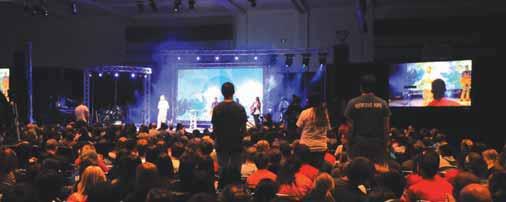






By Connie Faber, Myra Holmes and Jared Janzen

Mission as well as the U.S. Conference. Representatives from many of these ministries also briefly spoke during the evening sessions.
For participants who noticed the small things, there were subtle reminders that names and identity were the focus of the weekend. Event backpacks and water bottles were printed with the words “Named 2015.” Every participant’s name was in the program booklet. Pre-session games incorporated individual photos of students taken during registration. Lyrics to songs performed by James Isaac and the unNamed House Band during pre-sessions and sessions talked about names and identity.


The Named 2015 schedule included morning devotions for teens and sponsors led by Mark Thompson of MB Mission. Evenings included an hour following the worship session for youth groups to meet and discuss Richardson’s message and the day’s activities.
Tabor College and Fresno Pacific University, the two Mennonite Brethren-owned institutions, sponsored Late Night. A 600-person dodgeball game was the late night highlight Thursday. Friday night featured illusionist Joshua Jordan and For All Seasons playing their own songs. Saturday night it was inflatables. The two schools sent a total of 12 students to Denver to also assist the Named 2015 planning team as student interns.
There were a number of indicators throughout the weekend and beyond that Richardson’s messages as well as other aspects of Named 2015 impacted the students.
Students were invited to visit the Sharing Booth Saturday afternoon and evening to reflect on what God had been stirring in them and how they had changed their views on their identity. MB Mission videographer JohnMark Bergen filmed the students’ comments and testimonies, and these will be included in the Named 2015 recap DVD.
Students also posted their responses to the weekend on a variety of social media sites, including this comment from one student on the Named 2015 Facebook page: “My group experienced life-changing moments! I could talk for hours about the ways our awesome God moved. Thank you so much for all your hard work.”


















Named 2015 focused on identity, and speaker John Richardson connected well with students as he outlined who Jesus is and what Jesus says about the identity of his followers. Richardson, a graduate of Fresno Pacific University and Fresno Pacific Biblical Seminary, is the campus pastor at Mountain View Community Church Sunnyside, a USMB church plant in Fresno, Calif.
Richardson’s messages centered on answering key questions drawn from the conference text, Matthew 16:13-16:
■ When I test my identity, is it counterfeit or real?
Richardson encouraged his audience to “dokimazo”— a Greek word meaning, “to test”—whether their identities are based on things like appearance and popularity, achievement and works and a continual longing for the next thing. ”Don’t listen to anyone but God,” said Richardson.
■ Who does God say I am? “We are worth God becoming a human and dying a hellish death to win us back,” said Richardson. “God loves you and longs for you, not because you’re good but because he’s good.”
Richardson noted the page of verses in the Named 2015 program booklet that speak to who we are in Christ.
“Our problem is not knowing these things,” he said, “it’s living as if these are true.”
■ Who do I say Jesus is? “What you believe about Jesus will direct every aspect of your life,” said Richardson. Richardson repeatedly emphasized that when we identify with Christ, our lives should be different—our character and actions should line up with the character and actions of Jesus. “It is impossible for there not to be a change in our lives when we follow Jesus,” said Richardson. “He wants to make us new; he wants to restore.”
Richardson emphasized the importance of tenaciously removing sin from one’s life. “Do whatever it takes to get rid of the things that separate you from God,” he said. Richardson used a variety of personal stories as well as a sketch by One Time Blind to illustrate the importance of listening to the voice of Jesus instead of the voice of Satan.
■ Do fears keep me from moving forward in my faith? In his final message, Richardson noted that in Matthew 16:18 Jesus tells his disciples to “storm the gates of hell.”
Richardson listed practical ways his listeners can go on the offensive when they are back home. He encouraged his listeners to be bold. “Don’t let fear hinder you from what God wants you to do. Many of us tiptoe through life to arrive at death’s door safely,” he said. “Dance into the kingdom of God and make a difference in the world.”
Richardson asked students to respond in a variety of ways to what God was stirring inside of them. They were asked Thursday night to write three false identities with which they struggle on the identification cards placed on every chair. Saturday night Richardson asked the audience to again take out their identification cards and to list descriptors of their true identity. He also challenged the students to tell someone what they wrote on their ID cards. “If you want to be exactly the same this Monday as you were last Monday, don’t tell anyone,” he said. “But if you want things to be different, tell someone—even tonight.”
Friday Richardson invited those who wanted to make a first-time commitment to follow Jesus to stand on their

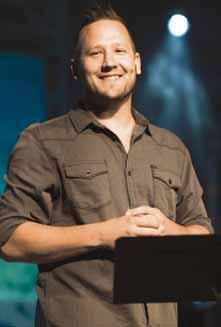
"Names are significant," said John Richardson, Named 2015 speaker. "Our name as 'Christian' means Christ-like. Our character and actions should line up with the character and actions of Jesus.”

chairs—14 students did so. He also asked those who wanted to recommit their lives to Jesus to stand on the floor and between 60 and 75 students stood.
Richardson wasn’t the only person to challenge the students. Saturday evening Ricky Sanchez, a missionary in Southeast Asia with MB Mission, spoke about his own


call to serve cross-culturally. When he invited those students who were feeling a call to “live a missional life” to stand, it appeared that between 65 and 70 people stood.
Sanchez was one of several agency representatives that spoke briefly during the worship sessions. Representatives of Tabor College and Fresno Pacific University, the two Mennonite Brethren-owned institutions, invited the students to consider attending one of the two denominational colleges. Wendell Loewen encouraged students to consider becoming involved with Ministry Quest, a leadership program for high school students operated by Tabor College and supported by USMB. Each session included opportunities for the students to prepare for and respond to Richardson’s messages by
By Connie Faber



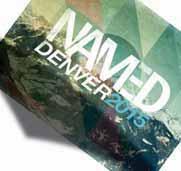





singing with For All Seasons, a five-member band from Southern California that led the audience in familiar worship songs. The students responded to the band with an enthusiasm that grew over the weekend.
One Time Blind, a drama troupe from Detroit, Mich., performed sketches Saturday and Sunday that were de-
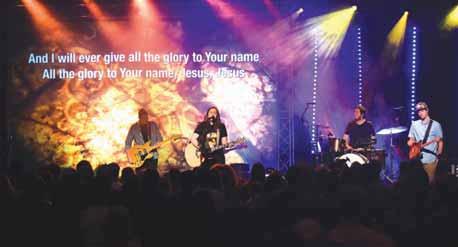
signed to “open us to what God wants us to do,” explained Ryan McCullough. Several of the sketches illustrated how Satan fights for control of our lives, reinforcing Richardson’s message.
The opening segment of the evening sessions was intended to evoke the feel of a late night talk show. James Isaac and the unNamed House Band performed prior to the sessions and provided a musical background to introductions of the various agency representatives. Session host and emcee Stephen Humber, a USMB pastor from Omaha, Neb., interacted with Ty Herrington and Peyton Loewen in short comedy bits. Herrington and Loewen also led pre-session activities.










Youth groups at Named 2015 spent Friday morning and afternoon serving 21 agencies throughout Denver. Their goal was to learn how God is at work in the city.
“We want to open our eyes, find where God is already at work and then go there and join him in that work in bringing new life, light and order to chaos,” Matt Ford, planning team member, told youth groups as they prepared for their Service Ops. Ford also told students he hoped this would help them recognize ways God is at work in their home communities and join God as his representative.
Organizing the departure of 766 students and youth leaders into the greater Denver area went surprisingly smoothly. Planning team members attributed this largely to help from a dozen interns and admissions staff from Fresno Pacific University and Tabor College, the two U.S. Mennonite Brethrenowned institutions, who had spent the previous afternoon preparing hundreds of sack lunches and then distributed them to each group Friday morning.
A number of the agencies were located in Denver’s poorest neighborhoods, areas where the air and water are polluted by nearby refineries or in so-called “food deserts” where the only stores available to buy groceries are places like 7/11 and Family Dollar. Some of these neighborhoods are being threatened with gentrification, where properties are purchased and new housing built, thereby raising property values but displacing low-income families who can no longer afford to live there.
EarthLinks Community Garden is located in one of these neighborhoods. Those who benefit from the garden are homeless or low-income families who grow fruits and vegetables and make and sell earthfriendly products. Youth from Mission (Texas) MB Church worked at landscaping the agency’s new property (photo below).
The long list of Service Ops projects also included planting trees in a park, working with Habitat for Humanity, working with organizations that help homeless people or young adults with neurological conditions, spending time at nursing homes and senior living communities and helping at a food bank.
Youth who served at Food Bank of the Rockies set a new record of 1,800 meals packed in one day, smashing the old record by about 600 meals. The 82 volunteers, representing Buhler (Kan.) MB Church, Koerner Heights Church of Newton, Kan., and Hesston (Kan.) MB Church, also helped the food bank with a number of other projects.
Arrangements for Service Ops were made through the Denver branch of DOOR (Discovering Opportunities for Outreach and Reflection), which connects volunteers with partnering agencies for service periods of a day, a month or a full year. Cindy Cervantes, associate director of DOOR Denver, said that the agencies she heard back from Saturday afternoon were reporting positive things about the youth groups’ work ethic. —Jared Janzen
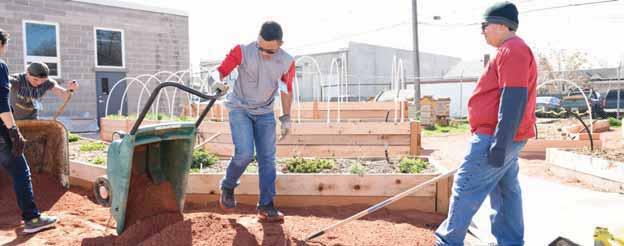



Attendees of Named 2015 were challenged to flesh out their identity in Christ through Learning Ops or learning opportunities, held in two blocks Saturday morning. While the conference theme and general sessions aimed to help youth better understand their identity in Christ, the Learning Ops were designed to give further ideas for living out that identity.
“Because we are named, we get to partner with God,” explains planning team member Joanna Chapa. The hope for Learning Ops was that youth would take away concrete examples of what partnering with God looks like.
As they delved into their particular topics, workshop speakers were encouraged to share their personal stories of being “named” in Christ. The most well-attended Learning Ops addressed leadership, worship, doubt and mission.
Rick and Karen Bartlett led “Who me? A Leader?” A total of about 200 attended in two sessions. Rick Bartlett is director of theological education at Tabor College Wichita, the Wichita, Kan., campus of the MB-owned college in the Midwest. The Bartletts challenged youth to consider how their passions intersect with the needs around them and how they might take one small step toward leading in that area.
An estimated 200 also attended one session led by For All Seasons, the California-based band who led worship during the conference. During “Who We Are and Why We Worship,” band members told about their journey toward worship and took questions from students about how to use their gifts.
Michael Suderman, evangelist and apologist with Ravi Zacharias Ministries, addressed doubt in his workshop, “Is Christianity Really True?” This was another popular option, with well over 200 attendees in two sessions and a questionand-answer time that overflowed the allotted schedule.
Ricky Sanchez, regional mobilizer with MB Mission in Thailand, told stories of people whose lives were changed as they identified with Christ—like a pastor who was imprisoned for boldly preaching the gospel and an HIV-positive orphan who began to share her faith after accepting Christ. About 130 attended “Risk Taking Obedience.”
The NYC planning team assigned rooms based on registration information, but students were free to attend Learning Ops spontaneously. One topic that drew more participants than expected was “Violence, Jesus, Peace and Us: Can Christians Use Violence When Necessary?” led by Trent Voth, associate pastor at College Community Church
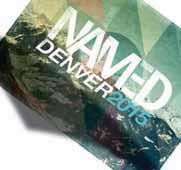
MB, Clovis, Calif. About 125 attended in two standingroom-only sessions.
Two sessions on values also overflowed the assigned space, with a total of about 120 attending “The Impact Our Values Have in Knowing Ourselves and Understanding Our Purpose,” led by life coach Chandelle Claassen, Newton, Kan.
Silence Breakers, a student group from Tabor College, led a total of about 100 attendees in a session on sexual addictions, “Renamed: Breaking the Silence about Sexual Sin with Biblical Truth.”
Other Learning Ops addressed immigration, military service, finances, vocation, neighborhood outreach and evangelism. Speakers included Ed Boschman, former USMB executive director; Saulo Padilla, Titus Peachey and Benjamin Peters, from Mennonite Central Committee; Wendell Loewen, director of Ministry Quest; Jon Wiebe, president and CEO of MB Foundation; and Rhonda Dueck, director of Micah Project.—Myra Holmes






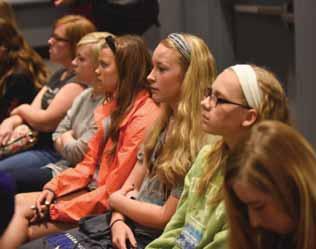

This month hundreds of students will graduate from our U.S. Mennonite Brethren schools—Fresno Pacific University in California and Tabor College in Kansas. FPU graduate Allison Ens is an example of the kinds of students and future leaders who are shaped by our USMB schools.
By all accounts, Allison Ens arrived at Fresno Pacific University (FPU) as a leader and high achiever. But her time as an undergraduate student at the Mennonite Brethren-owned university in Fresno, Calif., has provided fertile ground for growth, and her gifts have “blossomed,” to use the words of one professor. Now, as she looks beyond graduation, she looks for ways to use all her gifts to make a difference. Ens grew up in Olathe, Kan., and attended Community Bible Church, a USMB congregation in Olathe. She first learned about FPU through her participation in Ministry Quest (MQ), a leadership development program for high school students that was then operated by the MB seminary, part of FPU. Part of the MQ experience was a retreat held on the FPU campus. Impressed by the sense of community she observed, Ens added FPU to her list of potential schools.
Then she was awarded the university’s prestigious, full-tuition Paragon Scholarship, which tipped the scale decidedly in favor of FPU. But Ens says the school was a good fit in ways that go far beyond their generosity. FPU helped shape her academically, musically, emotionally and spiritually.
Learning to live the music
Ens is an accomplished cellist, and at one point imagined music would figure prominently in her future. “Cello is a huge part of my identity,” she says.
But FPU has a relatively small instrumental music program, which meant music became an extra-curricular activity rather than the centerpiece of her studies. She played with the Pacific Orchestra and the university’s string quartet and studied privately with Dieter Wulfhorst, cellist and associate professor of music. She has been particularly influenced by the way Wulfhorst “lives music.”
Ens has likewise learned to incorporate music into her life in a more holistic way. Although she arrived with a competitive mindset, music has become for her a “lens” through which she sees the world. “What has
always been a huge part of me has become even more woven into the fabric of who I am,” she says.
Wulfhorst says Ens has continued to develop musically at FPU, but also has developed as a person. “For me—for each of the faculty at FPU—it’s more important that students develop as human beings rather than just as cellists and musicians,” he says.
Music will continue to be part of her life after graduation; she plans to continue lessons with Wulfhorst and has a contract to play with the Tulare County Symphony, which, she notes, fulfills a lifelong dream.
Discovering a new passion
Ens is also gifted academically, and FPU has provided the greenhouse to explore and refine her academic interests.
As a freshman, Ens found a new passion in living biblical Hebrew. “Hebrew has been the academic equivalent of music,” she says. “It has completely changed my perspective of the Bible. Completely changed it.”
FPU’s living biblical Hebrew program uses a unique, full-immersion approach to learning the language and to understanding the intent of the Scripture. “It makes the beauty of the text come out,” says Brian Schultz, assistant professor of biblical and religious studies.
This required a new skill set for Ens. Rather than attacking Scripture with an analytical mindset, she had to observe and absorb—“to be carried along with the music,” as Schultz says.
Ens says that immersive approach has spilled over into other areas of her life, like her devotional life and even her music. And just as she has learned to relax into an incomplete understanding of Scripture, she is learning to be less driven and more comfortable with what she calls “the tension of promise and fulfillment” that characterizes so much of life.
Her introduction to a new way of looking at the Bible led her to declare a major in biblical and religious studies. “It makes sense,” she says. “This is one thing I’ve never wavered on.”
Finding support through struggle
Ens’ growth hasn’t been an easy journey. Far from home, adjusting to college life and struggling to understand health issues that manifested under that stress, Ens needed more than strong academics and
extra-curricular opportunities, especially early on. That’s when nurturing relationships at FPU made the difference.
People at FPU—from professors to student life staff to friends—offered counsel and pastoral care, extended hospitality, made sure she got the medical help she needed and generally helped her “process life,” as she says. “They kept tabs on me. They want me to succeed.”
Greg Camp, professor of biblical and religious studies who also served as her advisor for a time, points out that a smaller campus like FPU affords more points of contact for students and therefore fewer opportunities for students to “fall through the cracks.”
Ens says, “I’ve had the chance to figure out how to live life in a healthier, more holistic manner.”
Applying faith
Ens arrived at FPU with a solid Christian faith, but says working toward a biblical studies degree has been a catalyst for “exponential growth.”
She first made a commitment to Christ at a young age, then continued to process questions of faith as she participated in high school youth group. Russ Friesen, youth pastor at Community Bible Church, says Ens was a leader in the group and always keenly interested in apologetics, world religions and the distinctives of Christianity.
Like music and Hebrew, faith has become less of an analytic exercise for her and more of a wholelife commitment. Wulfhorst says, “She’s not just talking; she’s living it.”
Camp suggests that Ens’ world has expanded. Faced with urban poverty issues in Fresno that are “a world apart” from her Kansas up-
bringing, she’s been challenged to apply her faith in new ways as she looks beyond graduation.
Ens says she would like to explore how her gifts might intersect with those issues of poverty and justice in the Fresno area, perhaps through an intentional internship experience. Graduate school could be in her future, but again, with an eye toward applying knowledge in a way that genuinely helps people.
“At the end of the day, I really want to know how this knowledge helps people,” she says. “I love studying; I love language; I love the Bible; and I really love people. So I want to work toward how all of this can fit together and work toward a larger goal.”—Myra Holmes
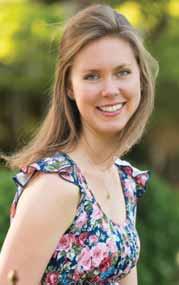




The Southern District Conference (SDC) summer camp program is unique among the five USMB districts in that it is organized by and for SDC. The district’s Youth Commission runs three camps each summer, attended by around 775 total campers.
This year’s junior kids camp (children finishing grades four through six) will be June 16-20 on the campus of Tabor College, the Mennonite Brethren liberal arts college in Hillsboro, Kan. Junior high camp (grades seven and eight) will be July 2-6 at Sky Ranch, Quapaw, Okla. Senior high camp (high school students) will be May 31June 5 at Horn Creek Ranch, Westcliffe, Colo.
Each year the Youth Commission selects a Scripture and theme for all district youth events, beginning in fall with junior and senior high district youth conferences and continuing through camps in the summer. This year’s theme is “Truth,” based on John 8:31-32.
“In a day and age where we are bombarded with the idea that there is no absolute truth, we want our students to really see Christ’s truth,” says Christy Goentzel, Youth Commission chair.
Organizing and running such a comprehensive district camp program is a significant investment, in terms of both personal energy and finances.
Bill Henneberg has been investing in junior high camp for over 20 years, first as a counselor and now as junior high camp director. He admits that by the time camp is over each year, he’s tired. “It takes a lot out of a person,” he says.
Goentzel notes that camp is expensive and costs are rising each year. In order to keep fees for campers reasonable, the district budget supports the camp program substan-
tially. “For that we are very grateful,” she says.
Organizers say it’s worth the investment because campers bring home more than sunburns and good memories. Since campers can attend camp from late elementary school through high school, they have multiple opportunities to form friendships with kids from other district churches.
“I think this is where the SDC camps have been able to excel over the decades,” says Hal Penner, administrative director for senior high camp. He notes that social media now provides additional connecting points.
Ultimately, the reason it’s worth the investment is because of the impact it can have in the lives of the next generation.
Ellen Funk, director of junior kids camp, says that special events, like camp, during the growing-up years “allow kids to hear from God in a different setting and in different ways.” She says that junior camp often results in first-time commitments to Christ and recommitments to a life of faith.
District youth minister Russ Claassen says, “Whether a decision is made to follow Christ or hearts are softened or relationships restored—whatever it is—our desire is to see lives transformed by the power of God.”
Myra Holmes

■ Planting NEW CHURCHES
■ Providing EVER EXPANDING IMPACT
■ Resulting in TRANSFORMED LIVES

Plentiful gardens, laden trees and blooming flowers abound in summer.
Please pray for our church planters as they seek the fruit of transformed lives.






Don Morris Mission USA director

Every so often I need to just stop, look and listen—at and about myself. I get so caught up in the whirlwind of working, traveling and doing that I must halt things for a moment in order to get a realistic handle on what I need to keep doing or stop doing. But, to be honest, the process often troubles me.
When I take the time to study myself, I too often realize that I don’t pray enough or spend enough quiet time with Jesus. That’s not good because I also detect considerable evidence of spiritual warfare to which I have not given heed. I’m not always aware that there’s a fight going on around me. When I peer into the mirror and look deep into my own eyes, I sometimes see a man who is clueless that the enemy is out to destroy him—me. In these moments I understand anew that Satan would love nothing more than to take me out of the game and take out my family along with me. He’d love to stop me from being involved in this church planting business, this whole thing of reaching people with the Gospel and seeing lives transformed. Satan hates it. He hates me. He hates church planting. And if you love Jesus, Satan hates you too.
We live in a culture that doesn’t like to think about evil very much. Most people would rather keep their head in the proverbial sand than think about Satan and his minions creating havoc in lives whenever and wherever they can. We live in a culture where even many dedicated Christians are reluctant to give much credence to Satan’s schemes. That’s dangerous.
FATHERS are spending MORE TIME with their children than ever before.
My wife, Janna, and I will be married 40 years this June. Over this past year we have seen the most intense spiritual warfare against our family than at any other time during these 40 years. I won’t go into the details, but it has been almost non-stop, one major thing after another since April of 2014. The thing is, all of us as believers go through difficult times. Sometimes the turmoil is due to living in a fallen world. At other times tough things happen because we make poor choices. But, at times, it’s all about what Peter wrote: “Be alert and of sober mind. Your enemy the devil prowls around like a roaring lion looking for someone to devour” (1 Pet 5:8).
I know I belong to Jesus now and for eternity. But, I also know Satan wants to mess up everything about me on this earth, to devour my family and me. He also wants to consume our church planters and pastors and their families. However, if we are alert—stopping, looking and listening to the Holy Spirit about what’s happening around us—we can detect the enemy’s schemes and make him flee. As James 4:7 says, “Submit yourselves, then, to God. Resist the devil, and he will flee from you.”
Are we alert? Are we of sober mind? Are we submitted to God and to resisting the devil? Are we making time to take stock of our lives and then to pray, really pray, and spend time with Jesus? If so, we don’t have to fear Satan’s conniving—like a coward, he’ll flee! Did YOU know?
While fatherlessness continues to be epidemic in America, those dads who are around are spending more time with their children and families.
In a 2012 Pew Research Center survey, 46% of fathers said they personally spend more time with their children than their own parents spent with them.
Lighthouse Church is a new Mennonite Brethren church plant being established on the west side of Denver, Colo. Church planters Josh and Brianne Shaw, along with Graham and Maggie Faul, will give leadership to this new work in an area that currently has few churches.
The Southern District Conference (SDC), Mountain View Community Church (MVCC) of Fresno, Calif., and Mission USA, the church-planting arm of USMB, are supporting Lighthouse Church. In addition, a few Denver churches that are a part of Acts 29, a network of church-planting churches, will provide leadership support.
Both Josh and Brianne were recent interns at MVCC, and MVCC lead pastors Fred Leonard and Dave Thiessen are highly supportive of their vision for planting a church in Denver. MVCC will assume the role of the church plant’s “mother church” even though they are hundreds of miles apart. Thiessen says, “We are thrilled to be able to partner with Mission USA and the Southern District to see a new church plant start in Denver.”
Josh Shaw will complete his master of divinity degree at Denver Seminary in May. Both the Shaws and the Fauls are graduates of Tabor College, where they became acquainted and began to dream about doing ministry together. Josh says, “After I began attending Tabor College, the thought of church planting became
more intriguing. Brianne and I have a deep love and compassion for the lost and for those who are unable to defend and provide for themselves.”
The Fauls just finished a ministry stint in Harvey, ND, and will move to Denver in May. “God has given a huge vision for Lighthouse Church,” says Graham. “He’s going to use it, he’s going to work through it, and I’m excited for the adventure.”
Current plans are for Lighthouse to use a local movie theater in the Colorado Mills Shopping Mall for Sunday morning services and to incorporate home groups as a core element of the makeup of the church.
“This is a great team with varied gifts that will enable them to maximize what they do and do it all very well,” says Don Morris, Mission USA director. “Only about 7 percent of the Denver population attends church on Sunday. Many people worship outdoor activities, almost like a religion. ‘Lighthouse’ is an appropriate name—brightness in the midst of darkness where people headed for destruction can come to know the one true light, Jesus.”
Morris says, “Let’s be reminded to pray for this new work as it will not be easy in this culture.”
Thinking about the magnitude of what God has called them to, Maggie says, “Amidst the challenge of being in over our heads, I am excited to be a part of something that requires God’s grace to succeed!”
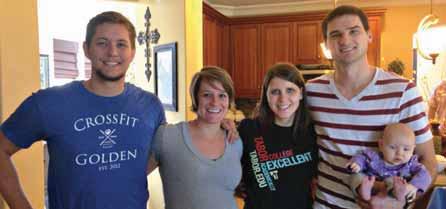

Anne and her 13-year-old daughter, Kate, sat among a group of parents and kids preparing for a youth group trip. Like most summer camps, it would be a week of rustic cabins, campfires and obstacle courses, designed to help the kids bond and grow through activities and downtime together.
The youth leader stood between the tables of campers. Checklist in hand, he gave final packing instructions as parents took notes, and then he set down the clipboard and walked to the front of the room.
“Who are our first time campers this year?” he asked the group. A few hands, including Kate’s, went up.
“This is going to be a great experience,” he assured them. “I’ve gone to these camps all my life, first as a camper, then a counselor. Now I get to be a leader, and I still love camp. But my favorite part has always been all of the people. There will be hundreds of kids there. I have made so many friends through the yearsseveral I’m still friends with today.”
At three of those words—hundreds of kids—Anne’s hand dropped from her notepad, her gaze shifting to Kate. And she knew. They wouldn’t need that packing list.
The very things that excited the youth leader—and nearly every other camper in the room—terrified Kate. If the thought of being in an unfamiliar location wasn’t unsettling enough, Anne knew that her daughter’s heart was racing at the realization that hundreds of kids would be on all sides of her.
This was yet-to-be-diagnosed social phobia. On a big scale, millions of people understand firsthand how debilitating this is. But in one single room to one single girl, she was the only one.
Integrating socially anxious kids is not an easy task, when it’s possible at all. Groups, especially youth groups are, by nature, structured for constant interaction, boisterousness and people who thrive in the middle of the action. This is not a bad thing. But it’s not a good thing for those who struggle with social phobia.
“Very few people understand the agonizing and traumatic depth of social anxiety disorder,” says Thomas A. Richards of the Social Anxiety Institute. “All day, every day, life is like this: Fear. Apprehension. Avoidance. Pain. Afraid of rejection, of not fitting in. Anxious to enter a conversation, afraid you’ll have nothing to talk about. They know that their anxiety is
irrational and does not make head sense. Nevertheless, knowing something is never the same thing as believing and feeling something.”
A recurring quote appearing within the social anxiety support community describes their encumbering feelings in this way: “Just because I’m scared of crowds (and most social situations) doesn't mean I enjoy invisibility.”
Several months after summer camp, with a Halloween church carnival on the calendar, Anne worked on Kate for a few days, convincing her to attend the party. Against every natural tendency, Kate agreed and walked into the busy event with her mother. They maneuvered through groups of people, made their way to the buffet line between hellos and handshakes and found a seat in the corner. As uncomfortable as Kate was, she stayed, she sat, she ate and she even agreed to help her mother with games for the younger kids.
As they walked to their post, one of Kate’s former schoolteachers passed them in the hallway. “Oh come on, smile Kate; it’s not that bad,” she tossed out without a single thought or second glance. This was the pinprick that deflated days of coaxing a vulnerable child to put herself out into the world.
And so it goes. One step forward. One step back.
There are methods, therapies, books and programs available to help kids separate themselves from their anxiety and to find coping strategies. But until the child is ready to accept their own potential (and during and after that time) they need one thing: an advocate. Someone to stand with them, believe in them, hear them, validate their feelings and point them forward when they step back.

Someone like you or me.
Shelley Plett is the graphic designer for the Christian Leader. She works in design and as a columnist for the Hillsboro Free Press, Hillsboro, Kan.

Carmen Andres
Ilove good stories, and some of the best stories today are on the small screen. Unlike films, the nature of television allows a story to unfold over a longer period of time, giving storytellers time to explore rich characters and complex stories in ways similar to novels.
Binge-watching is my preferred ways of watching television series with extended story arcs—and I’m not alone. A 2014 Netflix survey that examined how people are watching TV revealed that 61 percent said they make a practice of watching multiple episodes of a show in one sitting.
Watching a couple of episodes back-to-back or multiple episodes in a week makes a story told in episodes or chapters more cohesive to me. I am more engaged with the story, and it’s easier to soak in it—and that’s particularly effective when it comes to good stories. Good stories help us explore who we are. They reflect human nature and the world around us, telling us something about ourselves, others and the world we live in.
Good stories don’t only entertain but also confront, provoke and poke. They help us think through what we believe and why. If we are intentional, they can even change the way we approach life, people and the world.
“Story provides the most fundamental and most fertile way we have of making sense of human experience,” says Daniel Taylor in The Skeptical Believer “Life is not like a story. Life is a story. Your life is not like a novel. Novels are like your life—and that is why we read them.”
And, I would argue, why we watch them.
But good stories can lose some of their power if we have to wait a week between episodes or months between seasons. Watching a couple of episodes back-toback or multiple episodes in a week, however,
immerses us in the story and gives us the chance to engage it from start to finish—like reading a novel over a period of weeks instead of months (or years).
All this makes me think we could benefit from some regular binges when it comes to Scripture, too. Our tendency is to take Scripture in pieces, collecting various passages together under one topic or drawing single sections or chapters out for study. This kind of approach makes it easy to lose sight that, as Sean Gladding puts it in The Story of God, The Story of Us, “there is a Story contained within all the stories, poetry, prophecy and letters that the Bible comprises.”
One of the times I experienced this was when I met with a few other women in small groups modeled after Neil Cole’s Life Transformation Groups. In addition to prayer and confession, we also read huge chunks of Scripture each week—30 chapters, to be exact.
At first, I was skeptical of the practice. I was used to more meditative practices like Lectio Divina or studies that spent weeks on a section or book in Scripture. But after a while, I found myself immersed in God’s story in a way I had never experienced before—and that started to change the way I looked at myself and the world around me.
“My contention is that the single best way to think of faith is as a story,” says Taylor, “a story that you have been invited to join as a character with a role to play… a story that will fill your life with meaning and significance in a way that no competing story can match.”
I haven’t given up practices like Lectio Divina or indepth Bible studies. But periodically, I try to make it a point to go on a binge and spend time soaking in the larger story, too.
Carmen Andres is a freelance writer and former CL editor who lives in Alexandria, Va. She blogs at www.intheopen.blogspot.com.

One Time Blind is a drama troupe that has appeared at two National Youth Conferences as well as Southern District Conference summer camps. They communicate the reality of Christ in a modern-day language, using onstage conversation and dramatic elements to convey their message. Their downloadable short film illustrations for use in worship services, small groups and youth groups are available at www.onetimebiind.com You can also purchase One Time Blind scripts to stage your own dramas.


Jason and Erika Ban, Rene Elliot and Natalie Paulus were baptized March 29 and received as members of Butler MB Church, Fresno, Calif. Bun Thom, Phoy Noy, Sabastian Acero, Petrika Gjata, Carmen Snyder, Sandy Lindley, Sharon Retz, Shelly Coleman and Ryan Braathen were also received as members.
Billy and Catherine Walton and Carol Heisdorf were received March 29 as members of Bethany Church, Fresno, Calif. Robert and Iona Radtke were also received as members.
James Carter 2; Alysia Cook, Lieacha Cook, Paul, Aura and Madison Davis, Jason and Meagan Englert, Kiersten Goertzen, Lee and Donna Hansen, David and Alicia Kumer, Sarah Loewen, Dawn Rickerson, Bryan and Amy Rohr, Addison and Cassie Smith, Adam Weeks, Callie Weeks and Lanee Young were received March 8 as members of North Oak Community Church, Hays, Kan.
Riley Tabangcora, Ted Wright, Christopher Gowdy, Maguire Shannon and Adrian Jacob were baptized March 8 at Laurelglen Bible Church, Bakersfield, Calif. Abraham and Lincy Maliyekkal and Helen McCutcheon were received as members.
Peter and Erin Heim were received Feb. 8 as members of Garden Park Church, Denver, Colo.
Denise Martinez and Nick Carlson were baptized Feb. 8 at Mountain View Community Church Sunnyside, Fresno, Calif.
Delbert and Stephanie Flaming, Jeff and ShaRae Harden and Mark and Barb Lenz were received as members Feb. 22 at First MB Church, Wichita, Kan.
Chloe Pankratz was baptized Jan. 18 at Hillsboro (Kan.) MB Church. Megan Carter was baptized Dec. 28. Dwayne and Diane Claassen and Chloe Pankratz were received as members Feb. 22.
Jamie Moses was baptized March 1 at Axiom Church, Peoria, Ariz.
Madera (Calif.) Avenue Bible Church has called Jim Kennemur as lead pastor. An installation service was held April 12.
Eric Burns has been affirmed as the lead pastor at Laurelglen Bible Church, Bakersfield, Calif.
Stephen Stout is the intentional interim pastor at Faith Bible Church, Omaha, Neb., beginning Feb. 1. He also continues as the director of Good Neighbor Ministries.
Paul Triplett was installed March 22 as associate pastor at Birch Bay Bible Community Church, Blaine, Wash.
Aaron and Maggie Halvorsen were installed Feb. 8 as the new lead pastoral couple at Community Bible Church, Olathe, Kan. A farewell potluck was
held Jan. 25 for interim pastor Timothy Connor and his family.
Caitlin Baird began serving March 8 as associate pastor of children and family ministries at North Fresno (Calif.) Church.
Carlie Sturgeon began serving Jan. 1 as the children’s minister at The Heart, Tulsa, Okla. Mike Miller, pastor at The Heart, took a sabbatical Feb. 9 to April 6.
Nathan Engelman is the new campus pastor at New Life Church, Ulysses, Kan. The congregation welcomed him, his wife, Erica, and their five children March 1.
Peter Heim is now the associate pastor at Garden Park Church, Denver, Colo. He had been serving as interim associate pastor.
Adrian, Myrtle H., Buhler, Kan., member of Buhler MB Church, April 27, 1920—March 17, 2015. Parents: Henry J. and Katherine (Harms) Thesman. Spouse: Norman Adrian, deceased. Children: Phillip, Patricia Franz, Kenneth, Byron; 11 grandchildren; 12 great-grandchildren.
Berg, Ella, Hillsboro, Kan., of Hillsboro MB Church, May 7, 1930—Jan. 29, 2015. Parents: Karl and Bertha (Funk) Reddig. Spouse: Elton Berg. Children: Steve, Sam, Debbie Reynolds, Dave; 11 grandchildren; five great-grandchildren. Ediger, John W., Reedley, Calif., member of Reedley MB Church, Sept. 29, 1921—March 14, 2015. Parents: John B. and Elizabeth (Wiens) Ediger. Spouse: Edna Regier, deceased. Children: Phyllis, Norma, Stan; three grandchildren; four great-grandchildren.
Funk, Peter, Dallas, Texas, member of Bethany Church, Fresno, Calif., Sept. 25, 1914—Jan. 11, 2015. Parents: John and Susie Funk. Spouse: Martha Driedger, deceased; Ruth Wiens, deceased; Hilda Linda, deceased. Children: Miriam Sommers, Jim; four grandchildren; nine greatgrandchildren.
Gaddis, Beatrice (Bea) Louise, Edmond, Okla., member of Memorial Road MB Church, Edmond, June 21, 1943—March 5, 2015. Parents: M.L. and Hazel Trumbull. Spouse: Woody Gaddis, deceased. Children: Keith White, Lori Pettijohn. Gossen, Naemi, Corn, Okla., member of Corn MB Church, July 14, 1925—March 10, 2015. Parents: Cornelius and Anna (Thiessen) Bergmann. Spouse: Samuel Gossen, deceased. Children: Stanley, Gary, Alden, Melvin, Roseanne Schmidt; 19 grandchildren; 19 great-grandchildren.
Hein, Fern, Goessel, Kan., member of Hillsboro (Kan.) MB Church, Dec. 31, 1920—Jan. 15, 2015. Parents: William E. and Mary (Craney) Rollings. Spouse: Irvin E. Hein, deceased. Children: Bill, Donald, James, Sharon Unruh; 12 grandchildren; 20 great-grandchildren.
Kenan, Jackie “Jakie Ann” Jones, Lenoir, NC, member of the former Bushtown MB Church,

This year Operation Prom Dress (OPD), organized annually by Lincoln Hills Bible Church, Sioux Falls, SD, provided free prom dresses to 45 high school girls whose families otherwise couldn’t afford a dress. The first night of OPD, held March 6-7, focused on building connections between the volunteers and the girls. The evening was spent in discussions about relationships, purity and identity in Christ. The girls who attended included Christians, non-Christians, teenage mothers and some who were struggling with substance abuse. “We got the sense that the girls attending were longing to experience truth, love and guidance, and that’s what they got,” says Lauren Banik, who first organized OPD in 2007. Girls were required to attend Friday night to have an appointment Saturday to find the perfect dress. They were also provided with accessories and makeup to complete their ensembles. In past years when OPD was a one-day event, they gave away as many as 120 dresses, but they changed it to two days to refocus in-depth on the message of Christ’s love.—Jared Janzen
Vinewood Community Church, Lodi, Calif., marked 100 years with a day of celebration April 19. Current and former attendees were invited to a Sunday morning service with music and guest speakers, a luncheon and a concert by the West Coast Mennonite Men’s Chorus. Organizers say the church has always valued children, so the centennial celebration will also include a family-friendly picnic June 14. The congregation, first known as Lodi MB Church, was founded Jan. 1, 1915, with 21 charter members. The name was changed when they moved to their current facility in 1968.
The Valentine’s Day Extravaganza at Hillsboro (Kan.) MB Church, hosted by the men’s ministry, is an annual highlight and outreach event for the congregation. “This is a way we say a big thank you to all the ladies of both the church and community,” says Ron Duerksen of HMBC. The 2015 event, “A Night to Remember,” held on Feb. 14, featured a full spread of appetizers, catered meal and dinner music, all provided by HMBC attendees. Following dinner, Christian comedian Ken Davis entertained and inspired laughter. Free child care freed parents to enjoy the evening.

Lenoir, April 27, 1947—Feb. 15, 2015. Parents: Charles and Mary (Kincaid) Jones. Children: Julian, Audrey.
Leppke, Harry, Corn, Okla., of Corn MB Church, Jan. 11, 1932—Feb. 15, 2015. Parents: Ezra and Selma (Flaming) Leppke. Spouse: Ida Belle Kirkpatrick, deceased. Children: Larry, Marvin, Richard; seven grandchildren.
Manners, Daniel Lynn, Edmond, Okla., member of Memorial Road MB Church, Edmond, Nov. 15, 1953— Jan. 23, 2015. Parents: Clarence and Mary (Jarvis) Manners. Spouse: Leota Manners. Children: Tabitha, Lauren; one grandchild.
Neufeld, Ed, Fresno, Calif., member of Bethany Church, Fresno, May 20, 1935—March 20, 2015. Parents: John and Mary Neufeld. Spouse: Margaret Wiens, deceased. Children: Patty Neufeld Erdman, Pauline Stobbe, Phil, Pamela Celum; 13 grandchildren; one great-grandchild.
Rempel, Ruth, Fresno, Calif., member of Bethany Church, Fresno, Sept. 10, 1921—March 21, 2015. Spouse: Abe, deceased. Children: Clinton.
Sallaska, Erna Bartel, Fairview, Okla., of Fairview MB Church, Sept. 10, 1924—Feb. 13, 2015. Parents: Peter and Bienna (Kliewer) Bartel. Spouse: Eugene Sal-
laska, deceased. Children: Ronald, Garold, Eugenia Kroeker, Barbara Welk; eight grandchildren; 13 great-grandchildren.
Studebaker, Mildred Lucille Heinrichs, Modesto, Calif., of Trinity United Presbyterian Church, former missionary to India with the MB Mission Board, Oct. 5, 1923—Feb. 25, 2015. Parents: Theodore and Bertha (Fast) Heinrichs. Spouse: Dilwyn Studebaker, deceased. Children: Judy, Keith, Sheryl Fogal; four grandchildren, two great-grandchildren.
Thiesen, Donald George, Reedley, Calif., member of Dinuba (Calif.) MB Church, Nov. 30, 1924—Jan. 24, 2015. Parents: Henry and Sarah Thiesen. Spouse: Lillian Karber, deceased; Florene Kleinsasser Mendel. Children: Donna Wildearth, Ronald, Cedar, Stanley. Stepchildren: Jay Mendel, Rene Mendel Lebsock; seven step-grandchildren.
Vogt, Hilda, Hillsboro, Kan., member of Hillsboro MB Church, March 25, 1926—Feb. 17, 2015. Parents: Dietrich and Anna (Dick) Thiessen. Spouse: John Vogt. Children: Brenda Plett, Janette Brubacher, Michael; seven grandchildren; eight great-grandchildren.
Wall, Eloise, Fresno, Calif., member of Bethany Church, Fresno, April 14, 1943—March 24, 2015. Spouse: Ron, deceased.

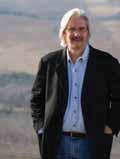


Zier, Venie Lee Hobbs, Fresno, Calif., member of North Fresno Church, Aug. 23, 1921—Feb. 1, 2015. Parents: Lee and Suzanna Hobbs. Spouse: John, deceased. Children: Mark, Becky Janz; eight grandchildren; 19 great-grandchildren.
Valleyview Bible Church, Cimarron, Kan., hosted “A Different Kind of Love,” a one day conference for girls in grades four through eight, April 25.
Attendees of Dinuba (Calif.) MB Church were challenged to 40 days of prayer beginning March 1, based on Mark Batterson’s book, Draw the Circle: a 40 Day Devotional.
The adult discipleship class of Koerner Heights Church, Newton, Kan., visited the county homeless shelter in March to become more aware of local ministry opportunities.
North Oak Community Church, Hays, Kan., offered a weekly class on preparing for college for high school seniors and their parents March 22-May10. Topics included friendships, academics, dating, finances, fun and spiritual growth.
Enid (Okla.) MB Church hosted a one-day marriage conference, “I Still Do,” Feb. 7.
Brain Noble, a pastor and certified peacemaker conciliator from Spokane, Wash., was the guest speaker
Lead Pastor: Bible Fellowship Church in Rapid City, SD, is seeking a full-time lead pastor for congregation of 180. Inquiries or resumes should be emailed to: PastorSearch@BFCRC.com
Lead Pastor: Community Bible Church, Mountain Lake, Minn., is seeking a lead pastor with a heart and call to ministry in a small community. Interested candidates should contact Bob Ewert at rewert@frontier.com or (H) 507 678 2221 or (M) 507 920 3472.
Associate Pastor: Kingsburg (Calif.) MB Church is seeking a full-time associate pastor for worship and youth. Inquiries or resumes should be sent to Kingsburg MB Church, 1301 Stroud Ave, Kingsburg, CA 93631 or emailed to kmbcsearch@gmail.com University Job Openings
Education: The School of Education at Fresno Pacific University has open faculty positions: Coordinator of Student Teaching Placement: Teacher Ed, Special Ed; Director of University Mentoring Program: Teacher Ed, Special Ed; Director of Teacher Education. Complete job descriptions and requirements at www.fresno.edu/careers.
Travel
Visit Europe the Mennonite way! Multiple hotel tours focusing on Mennonite-Anabaptist history in Holland, Belgium, Germany, Switzerland, Poland and Ukraine. Organized by Mennonite Heritage Tours, www.mennoniteheritagetours.eu
for a spring Bible conference at Fairview (Okla.) MB Church the weekend of March 1.
A March 29 chili cook-off at College Community Church MB, Clovis, Calif., raised funds for youth attending Named 2015.
Women from Zoar MB Church, Inman, Kan., went on a mystery outing April 25.
Attendees of Axiom Church, Peoria, Ariz., ate BBQ and played volleyball in a local park March 22.
Women from Buhler (Kan.) MB Church went on a retreat March 6-7.
Attendees of Grace Bible Church, Gettysburg, SD, went bowling together Feb. 27.
Men from Community Bible Church, Olathe, Kan., went on a retreat Jan. 23-24. The weekend kicked off with a chili contest.
“Known, Loved, Enough” was the theme for a women’s weekend at South Mountain Community Church, Draper, Utah, March 13-14.
Fairview (Okla.) MB Church hosted a women’s retreat March 27-28.
Youth from Koerner Heights Church, Newton, Kan., baked cookies and served them with milk during a Sunday morning fellowship time in December as a gift to the congregation.
Discovery Bible Fellowship, Collinsville, Okla., launched a midweek worship service April 15 for those who cannot attend weekend services due to sports or work commitments.
Neighborhood Church, Visalia, Calif., launched a third service April 12 to accommodate growth and visitors.
Bethany Church, Fresno, Calif., hosted a Palm Sunday hymn service March 29. Local organist Stephen Vincent led the service.
Volunteers from Mountain View Community Church Sunnyside, Fresno, Calif., offered free rides home to patrons of a local Irish bar on St. Patrick’s Day.
A multigenerational team from Koerner Heights Church, Newton, Kan., raked and cleaned gutters in November for church attenders who indicated a need. Junior high youth made Valentines for shut-ins in February.
Women from Corn (Okla.) MB Church organized a team of people willing to drive those in need to appointments in nearby towns.


